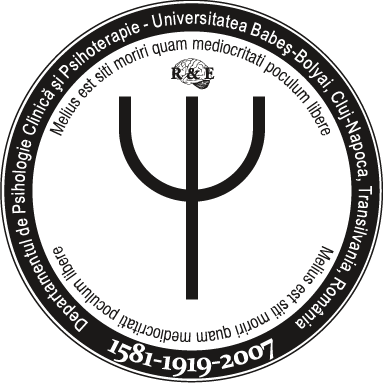The Platform for Robotics/Robotherapy and Virtual Reality Enhanced Therapy – The PsyTech-MATRIX PLATFORM
The platform includes multiple laboratories and technologies focusing on the integration of psychology and technology as means of promoting evidence-based mental health services, which represent one of the main research directions of the Institute.
The „Holodeck – Star Trek” Laboratory & The Virtual Club
coordinator: Prof. univ. dr. Daniel David; responsible: Lect. univ. dr. Silviu Matu
The laboratory includes an EON Reality ICube system with four projection walls. The system projects 3D images that are perceptible through active shutter glasses, at a frequency of 96Hz. Interaction with the user is naturally established through an infrared-based Natural Point tracking system.
The „Stress Control” Laboratory
coordinator: Prof. univ. dr. Daniel David; responsible: Lect. univ. dr. Silviu Matu
The Laboratory includes a HeadMounted Display (HMD; virtual-reality headset) virtual-reality system with a software dedicated to the treatment of anxiety disorders, developed by VirtuallyBetter. The system can be used for social skills training or for learning relaxation techniques. The laboratory also runs a virtual-reality software developed specifically for PTSD acquired after exposure to military conflicts (Virtual Irack and Virtual Afghanistan).
The lab is equipped with state-of-the-art Oculus Rift and HTC Vive virtual-reality headsets that use high-resolution, highly-immersive virtual-reality apps for the treatment of anxiety disorders. An innovative cognitive bias modification (attention, memory, and interpretation) application, developed together with EON Reality, can also be delivered using these headsets.
In terms of psychophysiological measures, the lab is equipped with a BIOPAC MP150 system capable of recording psychophysiological signals (EKG, GSR, EMG) relevant for the study of emotions. It can be synced with ?mutual? systems presenting visual and auditory stimuli. A 32 channel wireless EEG headset (EMOTIV Flex) is also available.
An array of mobile virtual-reality systems that utilize Samsung Gear VR headsets, smartphones, and wearable devices such as the E4 wristband produced by Empatica are available in order to monitor physical and psychophysiological activity. The lab infrastructure also includes a mobile SMI eye-tracking system.
The „Data/Robot-Based Therapy” Laboratory
coordinator: Prof. univ. dr. Daniel David; responsible: Lect. univ. dr. Silviu Matu
The lab is equipped with several therapeutic robots (NaoEvolution, Pleo, Keepon, Romibo, Robonova) that are employed for delivering robots-mediated psychological interventions.
The „Digital Affective Technologies for Therapy and Assessment” Laboratory
coordinator: Prof. univ. dr. Oana David
The laboratory is equipped with numerous mobile devices (smartphones, tablets) that allow for the development and testing of innovative mobile applications designed for delivering mental health interventions.
The lab has developed multiple mobile apps aimed towards emotional problems prevention, for children and adolescents as well as for the adult population.
The „Digital Enhanced Cognitive-Behavioral Therapies for Children, Adolescents and Parents” Laboratory
coordinator: Prof. univ. dr. Anca Dobrean; responsible Lect. univ. dr. Costina Păsărelu
The lab includes an HMD „Virtual Classroom” VR system that can be used for the diagnostic and treatment of ADHD. The system simulates a school environment and allows for objective indices such as cognitive tasks performance or activity level to be measured through a headset-integrated tracker.
The laboratory has developed and is administrating multiple online platforms aimed towards both prevention and intervention for emotional and behavioral problems in children and adolescents (REBTonAd, ADHDCoach).
The „Psychological Health Technology/Engineering ” Laboratory
coordinator: Lect. univ. dr. Silviu Matu
The laboratory is equipped with two therapeutic systems for delivering social robots-assisted psychological interventions for children with autistism spectrum disorder. Both systems have been developed and tested as part of the DREAM project, financed by the European Comission. One of them allows for the intervention to be delivered in a supervised-autonomy manner. The robot identifies the child’s behavior and responds according to the treatment plan, after being verified by a psychologist based on a set of sensors that collect data regarding the child-robot interaction and a response-analysis computerized system. The second system is a mobile and flexibile one, that involves a tablet running an application specifically design for controlling the robot and the treatment sequence.
Methods of access, conditions of use, and hours of operation
The platform is accessible to researchers from UBB, or other universities in the country and abroad, following the approval of a written request addressed to the Director of the Institute (ancadobrean@psychology.ro).
The request must specify the purpose of the request (e.g. research, educational, clinical services, information/community), the level of occupancy of the Platform, the period in which they will be carried out and a description of the activities in which the Platform is intended to be involved.
Hours of operation are Monday through Friday from 9 a.m. to 5 p.m. but are adjusted according to existing requests.
